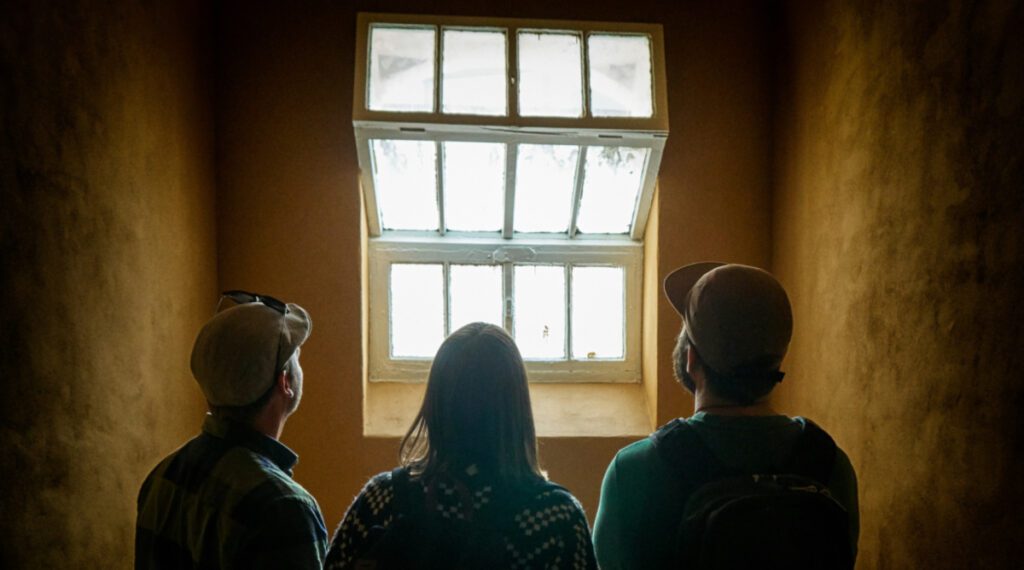What would you do if you won the lottery?
We’ve all wondered this. Most of us would pay of our bills, buy a more reliable vehicle and perhaps a new home, and then donate to charities. We could choose to donate 100% of it to charity but would reason it more responsible to keep the money, ensuring our own needs (including that of our family) are first met. That motive on the surface appears prudent rather than selfish. However, if we further unpacked our motives, we’d find that we might not need a new car or home. After paying off the credit cards, we’re likely to run up charges on them again; certainly, having the large sum of $$ in our bank account would tempt us to unnecessary purchases. Saving the money for our child’s college fund may influence choosing which college they attend, seeking one that is more prestigious rather than prioritizing the education offered and campus culture. Underlying all these motives is fear. Ultimately, retaining the money risks altering our vision of human flourishing to one that is more worldly.
See here, the camel disencumbered of his hunch passes through the eye of a needle (St. Bede, referring to Matthew 19:24)
In his Spiritual Exercises, St. Ignatius of Loyola gives us the Principle and Foundation, the attitude and disposition for following God’s will. We are to make use of creation as needed to serve Him in our vocation, no more and no less. This requires we be unattached to people, places, things, attitudes, opinions, ideologies, and worldly perspectives. It is an ongoing effort, a spiritual exercise that should take place as part of our daily examen and mental prayer as well as when making important choices.
We begin our spiritual journey focused on satiating our own desires. We consider the needs of others and are willing to be helpful as long as we are not suffering too much. God is third in our life; we keep Him on a shelf until we think we need His help. Thus, our life is centered as: ME—YOU—GOD. As we come to know God, He moves into being second-most important—ME—GOD—YOU. That doesn’t mean we stop caring for other people. Rather, we begin to care for them through Him. However, God is asking us to place Him as first in our life because that is where we will find true happiness. Permitting Him to love us, we become filled with His love to share with others. Love fulfills all of our needs and desires, heals all wounds, and destroys all fears. We can finally experience disinterested love, which means it serves the interests of the other rather than our own. Hearts purified; our life is properly ordered: GOD—YOU—ME.
This transition takes place most prominently in the second ‘week’ of the Exercises. During the first ‘week’ or movement in the Spiritual Exercises, having purged known sin and cooperating with God’s grace to battle sin as He illuminates it, the retreatant examines their past and present choices and motives. They consider the Two Standards of Jesus’ vs. Satan’s, and how the enemy entices them away from Jesus. Why are these things important? How have they become one’s identity? All of this is to form them in the character of Christ and is quite eye-opening. As motives continue to be examined, the retreatant prays an exercise known as the Three Classes of Men. The purpose of this exercise is “to choose that which is better” (Sp. Ex. 149). It isn’t to judge or condemn people nor to invoke scrupulous self-scrutiny. Rather, it is to observe and then reflect on one’s own motives in choices and acts, from the view of relationship with God (Sp. Ex. 150). As with all meditations, this is made in God’s presence, sitting with Him and all of the saints. Turning to Him, the retreatant asks Him for the grace to see and understand that which pleases vs. displeases Him; that which brings us into His love so that we then can conform our thoughts and actions to His Divine Will (Sp. Ex. 150-151).
Important is how these meditations are undertaken. In Ignatian prayer, the person is responsible for establishing their own prayer environment so they can focus on the meditation. They then read through it and enter into that ‘place’. For example, when meditating on the Gospel, they put themselves in that scene with Jesus. Finally, and importantly, they are responsible for their own disposition towards God, asking for specific graces to come from this prayer. When praying on the three classes of men, however, the retreatant is the ‘place’. Deep consideration of the character’s motives and ways of thinking is then to reveal their own. Their life story is the place; they are the character.
The first Prelude is the narrative, which is of three classes of men, and each one of them has acquired ten thousand ducats [a form of currency], not solely or as they ought for God’s love, and all want to save themselves and find in peace God our Lord, ridding themselves of the weight and hindrance that arises from their attachment to it. (Sp. Ex. 150)
The topic of this meditation is attachment to the object—money and wealth. But this is an analogy for any type of attachment. Having already overcome mortal sin and received the grace of newfound zeal to help Jesus save souls, the retreatant is faced with attachment to themselves. And the wound-driven fears that manifest as attachments slowly come to light. The old saying comes to mind: be careful what you ask for as He may give it to you! The retreatant has asked for the grace to “choose what is more for the glory of His Divine Majesty” (Sp. Ex. 152) which requires identifying all that is not.
Now we look at those three types of disciples more closely…
These three “classes of men” are all good, baptized Christians who on the surface do not want to risk their salvation. They think they are already living a proper Christian life. Those in the 1st class may just want to keep their ‘toe in the door of Heaven’ as the old saying goes. Knowing they are ‘saved’ is sufficient. They want to rid themselves of their attachment to this money, but they never make the effort to do so. This class of men seeks relief from the burden of their attachments so as to find peace. Each of us has had those slothful times where we want to rid ourselves of a flaw but never get around to it or, starting to take action, give in to our old comfortable habits. But what if the hour of death comes and you are still clinging to your attachments?
“[T]hose of the second class do more inasmuch as they take some steps—but only such as suit themselves, not such as are in accord with God’s will and good pleasure. And so they consider themselves ready to do anything else except actually part with the thing they love.” (Instructions, p. 334-335, para. 212, emphasis added)
Whereas the 1st class of people sought relief from their attachment, the 2nd class seeks control. These people have grown in knowledge of faith and made some amendments to life, but still insist on being the master of their life. This often manifests in controlling or passive-aggressive behaviors. For them, God is a useful instrument. This class of men is the troubled class. Before, when God was kept at a distant third in priority, He wasn’t manipulated or expected to conform to the person’s thinking. In that earlier stage, we use other people in our life for our purposes. But as mortal sin is purged and we start to move God into being second-most important, then too often we treat Him as we do others. This is why being in this stage can be a worse disposition than the first. “They want God to come to what they desire: weakness is not so bad as cool calculation” (Peters, p. 101). It is another manner in which we try to make God conform to us rather than us conforming to Him. We have sophisticated ways in which we steer choices to provide maximum pleasure with minimum effort or hardship, submit our pre-conceived ideas to God in prayer, and then choose that which emotionally resonates. As Servant of God Fr. John Hardon aptly stated, “If I am to be delivered from an obstacle to my spiritual progress, I must first be convinced that something I like is de facto an obstacle.” (p. 81)
In stark contrast, the 3rd class has a desire for God such that they are willing to live with the uncomfortable tension of making oneself vulnerable to another (God) while giving up control of outcomes and instead waiting for understanding to be given (Sp. Ex. 155). This requires coming to a holy indifference. “He must make an effort to realize that God and all His saints are present to him and that he moves in their presence.” (Peters, p. 102-103) These people not only want to be rid of the attachment; they also are indifferent to whether or not they keep the thing causing their disordered love. “So that the desire of being better able to serve God our Lord is the cause of them taking the thing or leave it.” (Sp. Ex. 155)
The purpose of this meditation is to want the End (God) rather than the means to Him (things). Looking back at the Principle and Foundation, the retreatant can see how our loving Lord is leading them to this detachment. This will continue to inform their daily examen and prayer, not only throughout the Spiritual Exercises but beyond. It is the call of the baptized Christian to be in the world but not of it, the life of grace as lived in God’s love.
Ad Majorem Dei Gloriam.
—————————-
References to specific sections of the Exercises adapted from The Spiritual Exercises of St. Ignatius of Loyola. Rev. Elder Mullen, transl. (1914) P. J. Kennedy & Sons.
Instructions on the Spiritual Exercises come from On giving the spiritual exercises: the early Jesuit manuscript directories and the official directory of 1599. Martin Palmer, ed. (1996) The Institute of Jesuit Sources.
References to the teachings of Fr. John Hardon come from Retreat with the Lord (1993) Servant Publications.
References to the teachings of Fr. William A. M. Peters come from The Spiritual exercises of St. Ignatius: Exposition and Interpretation. (1967) The Program to Adapt the Spiritual Exercises
Image: Unsplash




